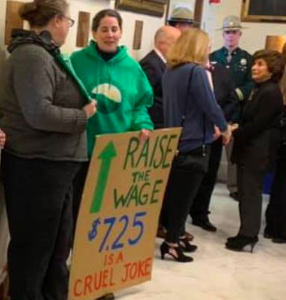In the midst of an acute labor shortage that has pushed wages to new highs, a few legislators have opted to introduce another bill to raise New Hampshire’s minimum wage.
House Bill 57 would raise the minimum wage to $15 an hour by 2025, then tie it to the inflation rate, ensuring regular, automatic increases.
New Hampshire has about 48,000 job openings, according to U.S. Bureau of Labor Statistics data, and only about 20,000 unemployed persons.
This imbalance between job openings and available labor has persisted for years. And that has driven wages in New Hampshire higher. New Hampshire Employment Security put the mean average wage at $30.12 an hour in last year’s report (based on 2021 data). In 2019, it was $25.94.
The average entry-level wage in the 2022 report was $14.36, up from $11.80 in 2019.
Competitive pressure is pushing wages up to the point that dishwashers have moved out of the list of the 10 lowest-paid occupations in the state. The lowest average wage in the 2022 report belonged to gambling dealers, at $11.59 an hour. Food preparation workers were above that at $12,10 an hour.
With a booming economy and a severe labor shortage combining to raise wages naturally, the market is already moving compensation in low-paying occupations toward the $15 an hour goal. House Bill 57 would mandate a $13.50 minimum wage by this September. Fast food restaurants regularly advertise jobs well above that rate now, and food prep workers on average are quickly approaching that level.
Into this discussion, researchers last month dropped yet another study showing that minimum wage increases have costs that can make people who work in the lowest-paid occupations worse off.
Researchers at the John Hopkins Bloomberg School of Public Health and the University of Minnesota-Twin Cities School of Public Health found that minimum wage increases reduced the number of employers who offered health insurance.
“We find that a $1 increase in minimum wages is associated with a 0.90 percentage point (p.p.) decrease in the percentage of employers offering health insurance, largely driven by small employers and employers with more low-wage employees. A $1 increase is also associated with a 1.80 p.p. increase in the prevalence of plans with a deductible and three percent increase in average deductibles.”
Though minimum wage hikes led to reductions in employer-sponsored health insurance, they did not lead to increases in uninsured rates, the authors found. That is “likely explained by an increase in Medicaid enrollment,” they wrote.
This study comes on top of decades’ worth of research that, on the whole, tends to find a negative effect on employment — particularly for younger workers and those with less education — from minimum wage increases.
The preponderance of research on minimum wage increases shows that government-mandated compensation increases are not cost-free. Forcing employers to raise wages in ways that are unrelated to productivity tends to result in shifting resources from other parts of the business. That can include eliminating hours, positions or benefits.
Advocates for high minimum wages seem to assume that employers, including small businesses, simply have troves of cash reserves lying around and pay what they do out of stinginess. But employers generally aren’t sitting on piles of treasure like Smaug in his cave under Lonely Mountain.
And employers can’t simply manufacture more money whenever they want to spend more. Only the government can do that. Employers have to make trade-offs. If the government makes them pay more for low-skilled labor, they’ll take that money from somewhere else. And the results won’t necessarily be net positive for the low-skilled workers legislators intended to help. Usually, the opposite is true.
Originally published at Josiah Bartlett Center for Public Policy





